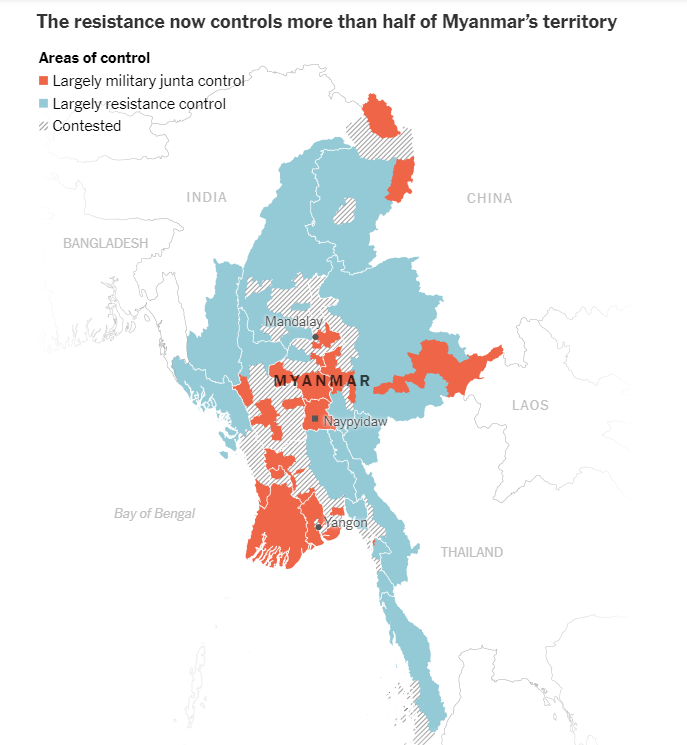
Bagan, an abandoned royal city in Myanmar with magnificent preserved brick temples. Image by Marc Veraart via flickr.com. License: Creative Commons
Since the military coup in Myanmar, the National Unity Government (NUG) has opposed the military junta. It now controls a large part of the country. This is also thanks to the decision to use cryptocurrencies such as Tether.
It is rare for rebellious movements to win unless they score a decisive first blow. As a rule, time works for the ruling power.
The opposite can currently be observed in Myanmar: the rebellion of the National Unity Government (NUG) is increasingly gaining ground against the military junta that took power in a coup in 2021.
Recently, the country’s main border town, Myawaddy, fell to the rebels. The NUG has thus taken control of numerous strategic border regions near India, China, Bangladesh and now Thailand. While the military junta continues to control the center of the country, the rebels have already conquered most of the periphery.
This unusually persistent rebellion also owes its success to the stablecoin Tether (USDT) and other cryptocurrencies. The NUG is probably the first rebellion movement in the world to successfully use cryptocurrencies for its own benefit.
How the NUG uses crypto
As early as 2021, the NUG made Tether the official national currency. Since then, she has demonstrated again and again that she is able to creatively use cryptocurrencies for her own purposes.
The rebellion is financed primarily through donations. However, due to pressure from the junta, donations from within the country have increasingly dried up, which is why the NUG is dependent on donations from the diaspora abroad. Millions of Myanmar people live in Thailand, hundreds of thousands in Malaysia, Singapore, Japan, Korea, the USA, England, Europe and so on. This diaspora collects money for the NUG. In order to circumvent the junta’s blockade – which extends not only to bank transfers, but also to PayPal – they are using cryptocurrencies such as Tether.
To this end, NUG began issuing digital bonds. Already in November she was able to earn several million dollars with these within a few days, and has now raised around 50 million. These interest-free bonds are purchased by the diaspora, not as an investment, but to support the NUG. The income is exchanged for Tether and brought into the country in this way.
In June 2022, the NUG then issued a digital version of the national currency, the Digital Myanmar Kyat (DMMK). This stablecoin tracks the Kyat on the Stellar blockchain and can be sent via an app called NUGPay. As of April 2023, there were reportedly 15 trillion digital kyat in circulation, equivalent to about $5.3 million.
NUG became even more innovative in 2023 when it founded the Spring Development Bank (SDB), a modern, blockchain-based neobank, in the summer. This should be “the financial pillar that sustains the flames of the revolution” – said the elected president of the NUG, Duwa Lashi La. The bank is like a “financial pavilion,” a “protected sanctuary for the public’s wealth.”
Spring Development Bank is not only building on Tether, but also integrating – now things are getting wild! – Uniswap pools on the Ethereum sidechain Polygon to exchange stablecoins for other currencies. For example, Singapore dollars, Thai baht, Korean wong or Japanese yen. “Our revolution against the military dictatorship is closely linked to blockchain technology,” explains a manager at the bank.
Shortly after its founding, the SDP issued a token (SDP), which it distributed via ICO until the end of November a good 10 million dollars played.
Hard dollars sting soft kyat
The turn to blockchain, stablecoins and Uniswap was probably born primarily out of the need to be able to receive donations. In traditional finance, the junta has a clear advantage because it not only controls central institutions such as the central bank, but can also put pressure on the private sector. However, cryptocurrencies have changed the game.
As a beneficial side effect, the turn to cryptocurrencies puts NUG in a more financially stable position. Like most dictatorships, the military junta combines economic incompetence with a desire for control. As usual, the national currency, the kyat, which has been increasingly losing value since 2021, is suffering. It is currently at a relative low of 0.04 cents.
However, this is just the official price. Like all autocratic currency regimes, the junta tries to stabilize the exchange rate through official exchange rates and currency and capital controls. As always, this leads to a flourishing of the black market and a decoupling of prices. In the summer of 2023, when the currency crisis worsened, the official rate was 2,100 kyat per dollar, while on the black market you had to shell out 3,500 kyat.
By relying on the stablecoin Tether, the NUG may have at least partially shielded its finances from this pull of devaluation. Their hard money, the dollar, beats the junta’s soft money.
Source: https://bitcoinblog.de/2024/05/08/rebellen-in-myanmar-draengen-militaer-junta-zurueck-und-kryptowaehrungen-spielen-dabei-eine-wichtige-rolle/



